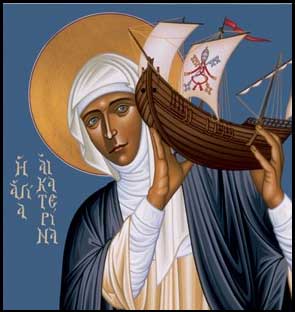In the preparation of this reflection I focused on the ‘Prayers’ of Catherine, in the hope of
acquiring some tips regarding the improvement of my own prayer. Sr. Mary
O’Driscoll O.P. of the Cabra Congregation, who is an authority on the teaching
of Catherine, having chosen her as the subject of her doctoral theses, has
supplied me with most of the facts on Catherine’s Prayers.
Only twenty six of her Prayers
have been preserved for us. These are not Prayers
that she herself wrote or even dictated to others. Rather, they were
transcribed by one or other of her followers who were present as she prayed
aloud. All of these Prayers belong to
the last four years of her life and so expound a certain maturity of her
thought.
They impress us by their simplicity, their intense concentration on God
who is repeatedly praised and thanked, and their constant desire for the
salvation of others. This echoes the motto of the Order: to praise, to bless,
to preach, always with the salvation of people uppermost in mind.
It is interesting to note how the themes that run through the Dialogue and Letters are taken up in the Prayers.
In them, Catherine’s theology becomes
her doxology.
Catherine was a great and powerful intercessor. In her Prayers, we find her pleading with God
passionately and urgently for mercy for all: for the world, the Church, the
pope, her friends and followers, all those in need. Knowing this challenges me
as I reflect on how I pray: do I focus intensely on God, in praising and
thanking him and do I pray with passion and urgency for others – do I pray from
the depths of my heart and with my whole heart? Catherine encourages us to do
so.
In Catherine’s own life the importance and intensity of her intercession
increased according as her union with God increased and as her concern for
others increased. This observation teaches us something very significant about
the prayer of intercession in the Christian life, namely, that it is not, as is
sometimes thought, a type of prayer beyond which one passes on the way to the
heights of mystical prayer, as though intercession were for beginners and mysticism
for those who are advanced in the spiritual life, but it is rather a type of
prayer, which belongs most particularly to the life of contemplative union with God and all of us,
every human being is called to union with God and communion with the Blessed Trinity.
This is the goal of all our lives and this is God’s greatest desire for each
one of us.
I will conclude with one of Catherine’s Prayers, entitled: ‘I Plead
with You for the World’, which is as relevant today as it was in
Catherine’s time, if not more so. Today we have so many countries at war: Iraq ; Syria :
the Ukraine ; the Holy Land;
and large scale persecution of Christians in many of these countries and others
like India and Pakistan
She prays:
Power of the eternal
Father,
Help me !Wisdom of the Son,
enlighten the eye of my understanding!
Tender clemency of the Holy Spirit,
enflame my heart and unite it to yourself!
I proclaim, eternal God, that your power is powerful and strong enough to free your Church and your
people, to snatch us from the Devil’s hand,
to stop the persecution of holy Church,
and to give me strength and victory over my own enemies.
I proclaim that the wisdom of your son, who is one with you, can enlighten the eye of my understanding and that of your people,
and can relieve the darkness of your sweet bride. (the Church)
And I proclaim, eternal gentle goodness of God, that the clemency of the Holy Spirit,
your blazing charity,
wants to enflame my heart and everyone’s and unite them with yourself.
Power of you eternal Father;
wisdom of your only-begotten Son in his precious blood;
clemency of the Holy Spirit,
fire and deep well of charity
that held this Son of yours
fixed and nailed to the cross-
you know how to
and you can
and you want to,
so I plead with you:
have mercy on the world
and restore the warmth of charity
and peace
and unity
to the Church.
O me!
I wish you would not delay any longer!
I beg you,
let your infinite goodness force you
not to close the eye of your mercy!
Gentle Jesus!
Jesus love!


